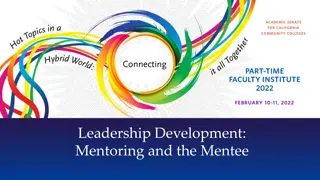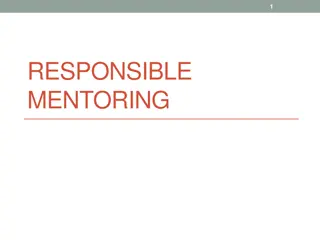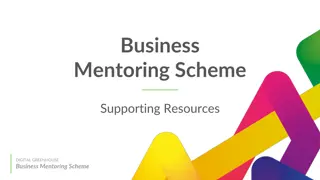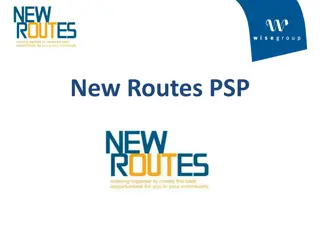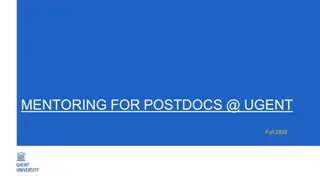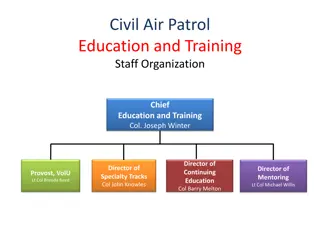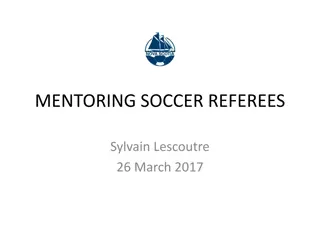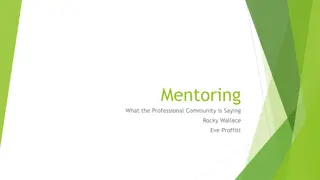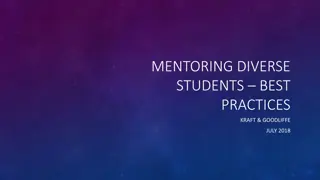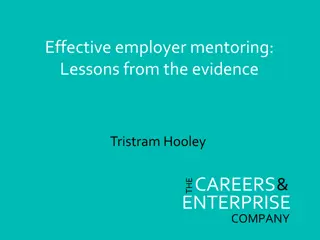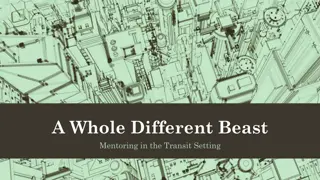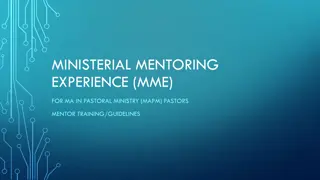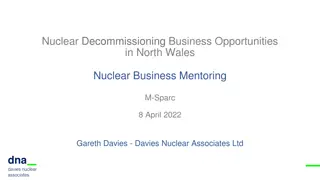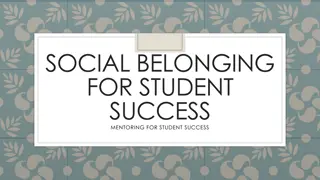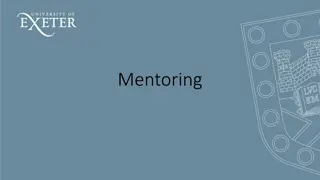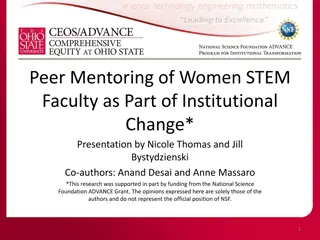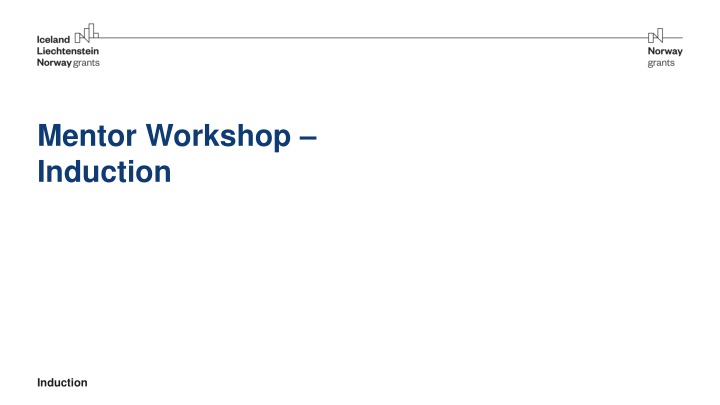
Empowering Entrepreneurial Success Through Effective Mentoring
Explore a comprehensive workshop induction guide on mentorship, covering introductions, mentoring approaches, roles and responsibilities, Garvey's 3-phase model, and mentees' expectations. Discover the essence of mentoring and the mentorship process through insightful perspectives.
Download Presentation

Please find below an Image/Link to download the presentation.
The content on the website is provided AS IS for your information and personal use only. It may not be sold, licensed, or shared on other websites without obtaining consent from the author. If you encounter any issues during the download, it is possible that the publisher has removed the file from their server.
You are allowed to download the files provided on this website for personal or commercial use, subject to the condition that they are used lawfully. All files are the property of their respective owners.
The content on the website is provided AS IS for your information and personal use only. It may not be sold, licensed, or shared on other websites without obtaining consent from the author.
E N D
Presentation Transcript
Mentor Workshop Induction Induction
Agenda Introductions & Agenda Who is ? Who are our mentees? Our mentoring approach Roles and responsibilities in mentoring Processes in mentoring: Garvey's 3-phase model Matching Values: Exercise Techniques: An overview What next? Questions and answers
Introductions Division into groups of 2 Time: 8 min (4 min per person) Afterwards, each person briefly introduces her/his interlocutor in 30 sec. Guiding questions: Who are you? What do you do? Have you worked with a mentee before? What are your expectations of today's workshop?
Who are... Who are we? Who are our mentees? Entrepreneurs from the region Either currently in the start-up process or active for less than 3 years. Age: 20-35 years Predominantly busineses in services Name of organisation Name of trainers delivering the workshop Experience in mentoring Objectives and scope of organisation Date of registration Typical topics: Development of a sustainable business model Strategy, entrepreneurial orientation Development as an entrepreneur Development as a person Acquisition of customers; marketing & sales # of employees Objectives, mission # of hours of support delivered per year Regional coverage
What our mentees wish for "Decision-making and reflection aid". "Impulse giver who discusses visions and goals and does not immediately label everything as impossible" "Someone who deals with our problems and finds the company exciting" "A contact person who shares their experiences and passes on tips" "I hope the mentor can also help me grow on a personal level" "New perspectives and someone I can rely on"
Our approach to mentoring "Mentoring is a learning relationship between two people. It requires trust, commitment and emotional connection. It involves listening, questioning, challenging and supporting. Mentoring has a time frame." Prof. Bob Garvey Business Mentoring works best in a phase of transition. In mentoring, the mentee's agenda always comes first Typically, three topics are worked on: Relationship Person Mentee s business Personal development Relationship between mentee and mentor
Roles and Responsibilities Mentee: Drives the agenda Responsible for progress Responsible for the relationship Mentee Mentor: Responsible for the process Responsible for the relationship Use of appropriate techniques and processes Mentor Mentoring Manager Mentoring Manager: Ongoing support for mentors and mentees Selection and matching Monitoring and evaluation
3-Stage-Model (B. Garvey) Mentoring involves a number of processes. Different mentors have different strengths and work in different ways. Regardless of which approach or style you use, you might want to work within a framework to offer the mentee the most help possible. I. Exploration III. Action Planning II. New Understanding
3-Stage-Model (B. Garvey) The model can be used in different ways: To think about what mentoring involves and to assess yourself as a mentor. I. Exploration As a timetable for a meeting to work through the phases As a map of the mentoring process - to see what points have already been III. Action Planning II. New Understanding covered and what still needs to be addressed To review the mentoring relationship over time as the mentee moves towards achieving the goals set at the beginning of the relationship To improve the shared understanding of the mentoring process and the mentoring relationship, and to develop the mentee's ability to apply the model independently. Garvey, B. (1998:31)
Matching Relevant matching criteria are whether the mentor's experience fits the mentee's needs. Our criteria are: Matching is not an exact science, but uses information that the mentor and mentee provide, for example, in their profiles, in the interview and in workshops. Shared values and beliefs The more similarities mentor and mentee have, the easier it is to establish a good working alliance and build trust. Availability Learning styles The greater the differences, the more opportunities there are to learn from each other. Skills/experience Location Entrepreneurial experience Sector specific knowledge Experience edge Interests Profile Interview Matching 1st Meeting Mentoring/ Monitoring Exit Mentor Workshop Coaching Submission Post Lon Support
Exercise: Values Select 10 values from the list that are particularly important to you - as behavioural guidance or as elements of a positive way of life. Add your own values to this list as you wish. Time allowed: 7'
Values & Principles adventure working on my own help other people recognition working with others working under pressure working peacefully excitement professional development democracy service for the public effectiveness honesty fast-paced life influence on others commitment close relationships nature rules/order personal development exploiting own potential quality of things participate in leadership money community quality relationships wealth purity religion fame self-respect safety exiting work love & affection power & authority top performance stability status spirituality spontaneity meaning of life environmental awareness independence responsibility financial security visions diversity & change growth wisdom truth ... determination ethical behaviour expert knowledge family helping others friendship cheerfulness challenges inner harmony integrity intellectual status competence controlling others cooperation physical challenges creativity art performance
Techniques Questions & Listening: Values and Principles, mind-set Dialogic Choices (Garvey) 3P-Model Thinking Partner (Kline) Pilot-in-the-Plane principle Working with narratives SWAT Rose-Bud-Thornes Decision making SWAT Strategy, Marketing & Sales Rose-Bud-Thornes Effectuation Process Effectuation process Business Model Canvas (Osterwalder) Scaling Story Board Dealing with dncertainty and concerns Controlling the Controlables (Covey) Effectuation: Crazy Quilt, Lemonade principles
References and Suggested Reading Alred, G. and Garvey, B. (1998) Mentoring. La Vergne: Management Pocketbooks (Management Pocketbooks). Garvey, B. and Stokes, P. (2022) Coaching and mentoring : theory and practice. 4th edition. London: SAGE. Egan, G. (2018) The skilled helper : a client-centred approach. 2nd edition. EMEA edition. Australia: Cengage. Kline, N. (1997) Time to think: listening to ignite the human mind. London: Ward Lock. Megginson, D. and Clutterbuck, D. (2005) Techniques for Coaching and Mentoring. Oxford: Elsevier Butterworth-Heinemann Osterwalder, A. and Pigneur, Y. (2010) Business model generation : a handbook for visionaries, game changers, and challengers. Hoboken, N.J.: Wiley. Pegg, M. (2020) The Positive s Encouragers Book: The art of encouraging people during our time on the planet. UK: The Strengths Organisation Ltd. Available from: <https://www.thepositiveencourager.global/the-positive-encouragers-book />
More information: YES! Thinking Space https://youngentrepreneurssucceed.com/thinking-space/




